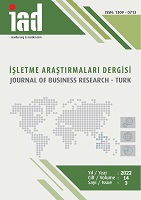Turizm Sektöründe Devlet Teşviklerinin TMS-20, BOBI FRS ve MSUGT Açısından Değerlendirilmesi Muhasebeleştirilmesi ve Karşılaştırılması
TMS-20 of Government Incentives in Tourism Sector, Evaluation of BOBI FRS and MSUGT Accounting and Comparison
Author(s): Bengü Açık Ateş, Seval ELDEN ÜRGÜPSubject(s): Political economy, Politics and society, Accounting - Business Administration, Tourism, Socio-Economic Research
Published by: Orhan Sağçolak
Keywords: Tourism; Government Incentive; BOBİ FRS; TMS-20; MSUGT;
Summary/Abstract: Purpose – In order for our country to develop, ensure economic order and stability and have the power to compete in the international arena, the help and support of the state is needed. Considering that the tourism sector, which is one of the sectors in need of this support, is a sector with a high investment cost, the need for government incentives increases. In addition, since the tourism sector is a service-oriented sector, it is more costly thannon-service-oriented sectors. For this reason, there are many incentives provided by the tourism-oriented government. In this study, it is aimed to show how the energy incentive, which is included in these incentives, is accounted for according to BOBI FRS, TMS-20, MSUGT reporting systems and what the differences are between them. Design/methodology/approach – In the study, it is aimed to explain and compare the incentives that the hotel business in Mersin has accounted according to the reporting systemsit has used over the years. By informing about the incentives given by the government to the tourism sector, information was given about how BOBI FRS, TMS-20, MSUGT reporting systems should be accounted for comparatively. In the hotel business we have given as an example, the accounting records of the expenses related to energy incentives are exemplified and compared according to the reporting systems. Accounting records taken from the enterprise are reported separately according to BOBI FRS, TMS-20, MSUGT, and the similarities and differences between them are mentioned.Findings – The acconting accounts used varied according to the reporting systems. These variations are also clearly seen in the journal entries. It is noteworthy that the reporting systemsin which tourism incentives are added to income are in the majority. In reporting systems where the capital approach is adopted, capital-oriented accounts such as funds and equities are used more heavily. It is aimed to examine and make suggestions according to each reporting system in order to ensure that the incentives are correct and understandable and that they provide transparent information to the authorized persons who will examine the reporting. In the given business examples, similar and differentreporting methods within the framework of financial reporting were discussed and comments were made about these reporting methods.Discussion – It is very important for businesses to account for government incentives by providing accurate and transparent information. When incentives are accounted for in revenue in the tourism company, they may appear as profits and may appear more than profits to authorized persons who follow the company’s reports. Gross profit from sales will be reflected in the financialstatements. In such a cade, it may be suggested to monitor the incentive received from the government in own resources or to deduct it from the cost of the fixed asset.There are two separate reporting methods in TAS-20 as income approach and capital approach. Transferring it to private funds according to the capital approach in TAS-20 will provide more reliable information.
Journal: İşletme Araştırmaları Dergisi
- Issue Year: 14/2022
- Issue No: 3
- Page Range: 1890-1903
- Page Count: 14
- Language: Turkish

